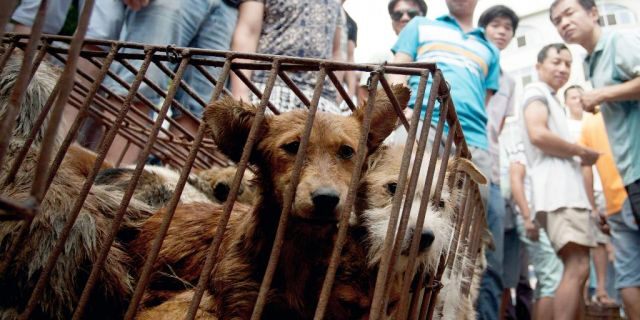In the wake of the coronavirus pandemic — which is believed to have first spread to humans at a “wet market” in Wuhan, China, where live animals were sold for food — China has created new guidelines on which animals can be bred for eating.
In one significant change, the rules reclassify dogs as pets rather than livestock.
The move signals an official turn against dog meat consumption, and animal welfare activists hope it will lead to an outright ban of the practice.
The Chinese Ministry of Agriculture and Rural Affairs said Wednesday that dogs would no longer be considered livestock, meaning they cannot be bred for food, milk, fur, fiber, medicine, or for military or sports purposes.
In the wake of the coronavirus pandemic — which is believed to have first spread to humans at a “wet market” in Wuhan, China, where live animals were sold for food — China has created new guidelines on which animals can be bred for eating.
The move signals an official turn against dog meat consumption, and animal welfare activists hope it will lead to an outright ban of the practice.
The Chinese Ministry of Agriculture and Rural Affairs said that dogs would no longer be considered livestock, meaning they cannot be bred for food, milk, fur, fiber, medicine, or for military or sports purposes.
In a memo explaining its choices, the ministry listed the “progress of human civilization” and the “public’s concern” for animal welfare as reasons for reclassifying dogs as companion animals from traditional domestic animals.
It also said that dogs are not considered livestock elsewhere around the world, and China now aims to follow those global standards.
The draft, which details which animals are allowed to be bred for meat, medical and other uses, lists 18 traditional livestock species, such as cattle, sheep, horses and chickens and 13 “special” species such as reindeer, alpacas, ostriches and foxes.
The ministry is now seeking public comments on the guidelines by May 8, before they are finalized.
Researchers believe the novel coronavirus originated in bats and then passed through another species to humans at a wet market in Wuhan, where the outbreak was first detected in December. Since then, COVID-19 has infected more than 1.6 million people worldwide and caused over 100,000 deaths.
In January, China temporarily banned the breeding and trading of wild animals during the pandemic, but it will soon resume the practice under the revised guidelines.
While dog meat remains a delicacy in some regions, it has become increasingly less popular. Last month, the city of Shenzhen became the first in the country to ban its consumption.
Humane Society International (HSI) called the new guidelines a potential “game-changer moment” for other cities in China to follow Shenzhen’s lead and outright ban the consumption of cats and dogs.
“This is the first time we’ve ever seen China’s national government explain that dogs are companion animals,” Dr. Peter Li, China policy specialist at HSI, said in a press release. “Recognizing that dogs hold a special bond with humans is an essential first step towards eliminating the consumption and trade in dog meat. This could be a pivotal moment that provides encouragement for other cities across the country to follow Shenzhen’s lead to ban the eating of dogs and cats.”
According to HSI, around 30 million dogs are killed each year for meat in Asia, despite warnings from the World Health Organization that their trade spreads rabies and other health risks.
“Tens of millions of dogs and cats every year, mostly stolen pets, suffer for the meat trade which is almost entirely fueled by crime and, perhaps most significantly right now, poses an undeniable human health threat with the risk of diseases such as rabies and cholera,” Li said.
While HSI applauded the move, it remains concerned about the other animals on the list, both in terms of welfare and disease prevention.
“Rebranding wildlife as livestock doesn’t alter the fact that there are insurmountable challenges to keeping these species in commercial captive breeding environments, and that their welfare needs simply can’t be met,” said Dr. Teresa Telecky, vice president of wildlife at HSI. “In addition, there’s clear evidence that some of these species can act as intermediate hosts of viruses, such as COVID-19, which is why we’re urging governments around the world to stop trading in wildlife.”
